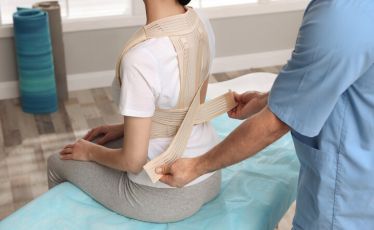+62 817-4929-054
Myths About Hip, Back Pain and Pinched Nerves

Waist and back pain is a problem that many people complain about. When experiencing this, some people worry that they have a pinched nerve. This worry is increasingly weighing on the mind because there is an opinion that a pinched nerve must be operated on. What makes you even more anxious is that it is said that surgery on the spine can cause paralysis. Is that right?
Not all of society's assumptions are correct. Most of these are misleading myths. How's the explanation? Let's look at the description of the orthopedic and traumatology specialist from Premier Bintaro Hospital (RSPB), Dr. Omar Luthfi, Sp.OT (K) Spine, about these myths.
Myth 1: Back Pain is Definitely a Pinched Nerve
In fact, lower back and upper back pain can be caused by many factors. Apart from pinched nerves, there are other causes that can cause back pain, such as muscle injuries, ligaments, spinal displacement, and disorders such as scoliosis.
“To determine the cause, it is necessary to be examined by a doctor. The examination is carried out in stages as needed, starting with anamnesis (interview) and physical examination. "If necessary, examinations with supporting equipment such as X-rays, MRI and CT scans will also be carried out," explained Dr. Omar is a consultant spine doctor.
Next, treatment/handling will be carried out according to the results of the diagnosis. Treatment for back pain caused by muscle or ligament injuries is certainly different from treating pinched nerves.
Myth 2: Pinched Nerves Require Surgery
In fact, treatment for a pinched nerve is carried out according to the results of the examination. Treatment may include medication and physiotherapy. If both conservative treatment methods provide good results, the patient does not need to undergo surgery.
“Every treatment step taken by the doctor is based on certain indications. "Surgery is usually only needed in cases of pinched nerves which cause weakness/paralysis of the hands or feet, or prolonged pain that cannot be improved with medication or physiotherapy," explained Dr. Omar earned his medical degree and specialty from the Faculty of Medicine, University of Indonesia.
Myth 3: Pinched Nerve Surgery Makes You Paralyzed
When a patient is indicated for surgery, do not delay. Surgery will relieve pain, prevent worsening of the condition, and recover the patient. Unfortunately, there are patients who are indicated to undergo surgery but refuse because they are afraid of becoming paralyzed.
Regarding this fear, dr. Omar explained that there is a risk of paralysis in spinal surgery, but the risk is very small, less than 2%. This risk can also be further minimized with correct surgical procedures. Moreover, currently spinal surgery methods are increasingly sophisticated.
"There is an endoscopic method that allows surgery to free a pinched nerve to be carried out with small incisions and with greater precision so that the risk of paralysis can be avoided," explained dr. Omar.
Myth 4: After Surgery Mandatory Bed Rest Long
In fact, surgery to free a pinched nerve can be performed using an endoscopic method that does not require prolonged bed rest. Because, this method is carried out with only two small incisions, around 1 cm, to insert the scope (special camera) and special operating tools. Through a monitor screen connected to the scope, the doctor can see the tissue in the spine. Then, with surgical tools the doctor frees the pinched nerve.
“With the endoscopic method, because the incision is small, the patient's recovery time is faster. In fact, a few hours after the operation the patient is immediately trained to sit, then stand and walk. The next day the patient can go home and continue movement exercises at home. "Patients can do activities such as walking, even climbing stairs," explained Dr. Omar.
Patients can feel significant benefits immediately after surgery, namely freedom from pain. Especially for patients who have previously been paralyzed for a long time, it takes them longer to be able to walk again, but there are also those who still cannot walk.
“Because, compared to other tissues such as muscles, damaged nerves are difficult to recover. "This nerve damage can occur in patients who have previously been paralyzed for a long time," added Dr. Omar.
Myth 5: Elderly People Cannot Have Surgery
The patient's age is not the only determinant of whether or not he can undergo surgery. Before undergoing surgery, the patient will undergo a number of examinations to determine the function of his vital organs. A medical specialist will carry out an examination and look at the results of laboratory tests to confirm the patient's condition. Then, a heart and blood vessel specialist will ask the patient to undergo an ECG examination and possibly an echocardiography test to determine the strength of the heart's pump. Then, a pulmonary specialist will also confirm lung function.
"If everything is normal, surgery can be carried out even though the patient is old," said Dr. Omar.
Even if there are conditions that are less than ideal, for example, kidney function has decreased, the patient has diabetes, high blood pressure, or has asthma, the patient will undergo treatment first to optimize his condition so he can undergo surgery.
“So far, at the RSPB, there are very few patients who cannot be operated on at all because their general condition is not good. So, for elderly patients, don't worry. The team of doctors will definitely take into account the ratio of benefits and risks of surgery. If the benefits outweigh the risks, surgery will be carried out. "If surgery is prohibited for all elderly patients, it is certainly not wise, especially since the majority or around 70% of patients with spinal disorders are over 50 years old," concluded dr. Omar.
Contact Centre: 1 500 908
WhatsApp Chatbot Appointment: +62 8122 2309 911

dr. Omar Luthfi, Sp.OT (K) Spine
Orthopedi & Traumatologi View Schedule| Loading data... |
|---|

















